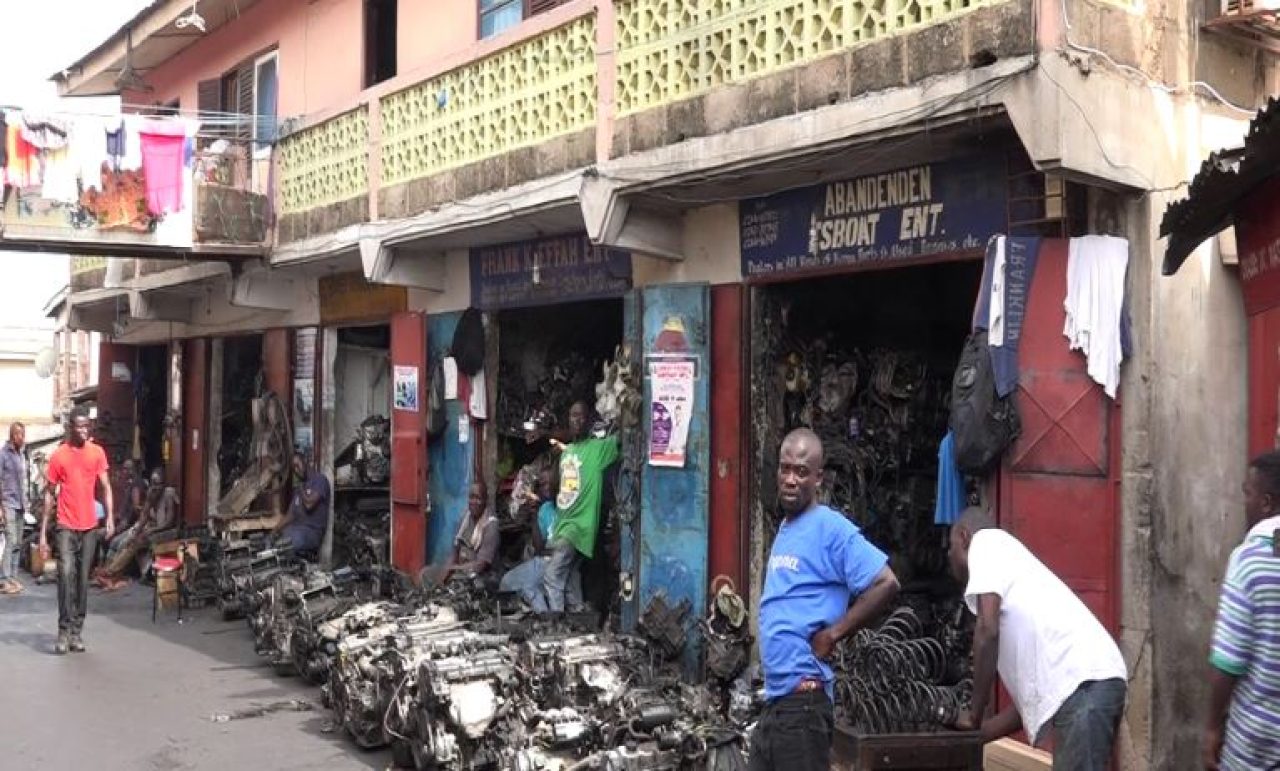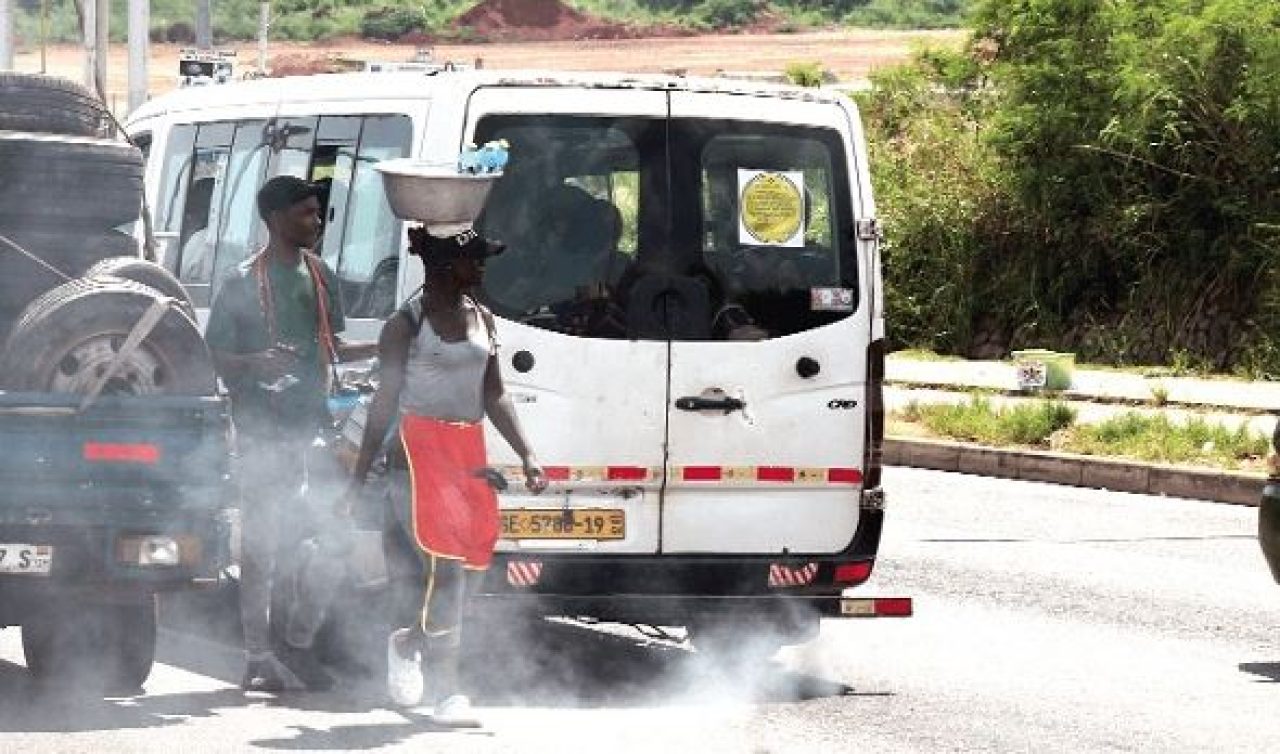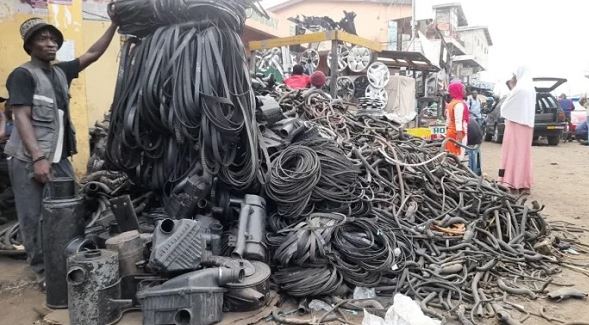Over 280,000 automobiles were transported from the Netherlands to West Africa, and 80 percent of those vehicles were “old and below the Euro 4/IV emission standard,” frequently lacking the necessary “roadworthiness certification.”
According to UN Comtrade data, the European Union sold vehicles to Ghana valued at more than US$275 million during the past five years. “Many of these cars are similar to what we think of as end-of-life cars.”

Accra’s annual concentration of air pollution was 11 times higher than the WHO air quality limit as of 2020, with an estimated 40% of its air pollution concentrations related to vehicle transport emissions.
The Ghana Road Safety Authority and Ghana Norms Authority, the country’s local regulatory bodies, do not currently have any scientific requirements or emissions standards for vehicle parts imported into Ghana.
A wide variety of imported auto parts from Europe and other parts of the world can be found in Accra, Ghana’s bustling Abossey Okai market. For those looking to repair or upgrade their vehicles, the market is well known for its extensive selection of auto spare parts, which includes both new and used parts.
But in addition to endangering lives, the importation of used auto parts and obsolete vehicles from Europe into the market is seriously polluting Ghana’s environment.
Robert Dumevo, a mechanic who owns a business in the Accra neighbourhood of Lapaz, tells the story of how he nearly avoided dying while travelling on the N1 highway. He had fixed a broken exhaust pipe on a customer’s Hyundai Sonata, not realizing that the item he had replaced was likewise defective and had caused the car to catch fire during a test drive.
“I was driving a ticking time-bomb. My lungs were engulfed in smoke and I struggled to breathe. I realized there was trouble when I tried to escape and my seat belt got jammed. I could feel the fire under my feet,” Robert recalled with some hint of trepidation.
Robert blames “unscrupulous spare-part dealers” at Abossey Okai – Accra’s largest hub of spare-parts importers where he bought the replacement part. “When you buy a used spare-part at Abossey Okai you cannot tell if it is fake, sub-standard or faulty. Some businessmen are involved in the selling of sub-standard spare-parts, making it difficult to do our work,” he explained.
Abossey Okai – A morgue for used car parts and end-of-life (ELVs) vehicles from Europe
Clement Boateng the chairman of the Abossey Okai Spare Parts Dealers Association, admitted that the prevalence of sub-standard auto parts ending up in vehicles and causing safety and environmental issues stems from the nature of auto parts imported from abroad. “Most of the second-hand auto parts dealers import parts from salvaged and end-of-life vehicles,” Clement revealed.
There are “over 15,000 shops” at Abossey Okai, with over fifty-five percent engaged in the import of used auto spare-parts from abroad, he said, adding: “When importing used auto parts, you must be there for physical inspection or have a trusted client. Otherwise, you stay in Ghana and they will load trash auto parts into containers to you”.
One of the main industries in Europe and West Africa is used auto parts and vehicles. According to information from the Dutch Environment and Transport Inspectorate (ILT), “nearly a million light-duty automobiles are exported from Europe to Africa each year.” According to UN Comtrade data, the European Union has sold vehicles worth more than US$275 million to Ghana over the past five years, with Germany being the largest exporter.
According to ILT, “many of these vehicles are equivalent to those we consider end-of-life vehicles,” raising concerns about the type of port inspections conducted in Europe prior to export.
A car exporter with many years of experience located in Germany is Frank Duru. He clarified that occasionally, a personal nod of approval will take the place of an official car examination before export. Even though some of the vehicles lack a roadworthiness certificate, he said, “we can still tell they are in decent shape.”
“Neither the exporting nor importing countries have minimum requirements in place to ensure that only quality used vehicles are traded,” said Veronica Ruiz Stannah, an expert on transportation at the United Nations Environment Programme.
This makes it possible for a lot of secondhand cars and car parts in poor condition to pass inspections at European ports and travel to West Africa, where they pose serious risks to individuals like Robert’s safety, the environment, and their health.
Reaction to the trafficking of secondhand components and ELVs in Ghana and Europe
ILT did a research in 2020 on the export of used vehicles from Europe to West Africa. The study revealed that 80 percent of 280,000 vehicles exported to West Africa from the Netherlands were “old and below the Euro 4/IV emission standard”, and often lacked requisite “roadworthiness certification”.

The study also noted that the trend was not entirely different among other European markets such as Germany, Belgium and France, Netherlands and Italy.
After completing inspections with Customs officials, Marietta Harjono, a coordinating specialist at the Human Environment and Transport Inspectorate (ILT) of the Netherlands, said that inspectors can halt the “worst vehicles, when they are waste or hazardous waste,” at the harbours.
Commercial vehicle exhaust in Accra in 2022. Photo by Maxwell Ocloo
She emphasized, however, that even while many of the used automobiles might not be considered waste, they might still not be suitable for export.
“Environmental and health difficulties would occur in circumstances where third nations lack a sufficient framework for handling cars that reach their end-of-life position and become waste,” ILT stated in a 2021 proposal to the European Commission (EC) on the modification of EU rules on end-of-life vehicles.
The ILT reports that although the European Commission is currently amending its Directive on end-of-life vehicles (ELVs), it is still unclear whether a “cross-border feature” will be incorporated to stop the export of ELVs to nations like Ghana and Nigeria.
Questions about ELVs and used spare parts that end up in countries like Ghana were not answered by the EC.
The Ghana Road Safety Authority and the Ghana Standards Authority, Ghana’s local regulators, do not currently have any scientific specifications and emissions standards for auto spare-parts exported to the country, despite the health and environmental issues brought on by end-of-life automobile parts and vehicles from Europe.
Kwame Koduah, the Ghana Road Safety Authority’s head of regulation, inspection, and compliance, told iWatch Africa that discussions are currently taking place between his organisation and the Ghana Standards Authority (GSA) “to ensure that spare-parts imports at least meet some conformity test and standards.”
In a written answer sent in response to this probe, the Ghana Standards Authority also stated: “The GSA does not have a formal policy relating to vehicle spare-parts. The Authority is working to create national standards for spare components (replacement parts).
Ghana, however, enacted a law in 2002 that penalised importers of automobiles older than ten years and increased the cost of doing so.
Environmental, health, and emissions-related issues
Despite this law, it is common to see several cars spewing thick exhaust fumes while driving around Accra, the city of Ghana. This poses a health risk to numerous pedestrians, street vendors, and business owners, and each year hundreds of people pass away as a result.
According to the Air Quality Index, approximately 16 percent of Accra’s air is very polluted and harmful, with an additional 30 percent of the air being unhealthy for sensitive populations like persons with asthma.
Dr. Francis Chisaka Kasolo, the World Health Organization’s representative in Ghana, noted that air pollution was the biggest environmental risk causing early deaths from heart attacks, strokes, and respiratory illnesses in the nation at a celebration of the International Day of Clean Air Blue Skies last September.
As of 2020, Accra’s annual concentration of air pollution was 11 times higher than the WHO air quality limit, with an estimated 40% of its air pollution concentrations linked to vehicle transport emissions.
90 percent of the 100,000 vehicles the nation imports each year are pre-owned vehicles. The majority of the vehicles in use in Ghana today are Euro 1 and 2 vehicles, which are the dirtiest according to EU emission rules.
Legislation passed in 2020 that aims to fully prohibit the import of automobiles older than 10 years has not yet been put into effect by Ghanaian authorities.
During a session at COP27, Daniel Essel, the deputy director at the Ghanaian ministry of transport, praised the legislation but omitted to mention that the government had chosen not to put it into practise, raising questions about the dedication of Ghanaian officials to addressing issues related to ELVs and used car parts.
“Policymakers in Ghana are not doing enough to curtail used vehicle consumption, and to that end reduce the harm – crashes, pollution, etc. – that come with it,” says Festival Godwin Boateng, a Ph.D. researcher at the Centre for Sustainable Urban Development at Columbia Climate School in New York.
Way Forward
To safeguard the environment and public safety, Dr. Boateng insists that any ban on ELVs in Ghana should be couched as part of broader policies: such as investments to make public transport, walking and cycling cleaner, safer and affordable, as well as investments in city planning and mini-bus electrification.
For a regional solution, the ILT recommends that: “African governments must agree as much as possible to harmonised or regional import standards for used vehicles. Whether it is on maximum age, minimum euro class, maximum mileage, proof of roadworthiness, and/or condition of the vehicles at export”.
Sadly, thousands of people, including the environment, suffer as a result of years of weak laws on the import of ELVs and old car parts. Robert just avoided a tragic conclusion.
Robert predicts that “many individuals will continue to death each year” due to no fault of their own unless the proper steps are done.







